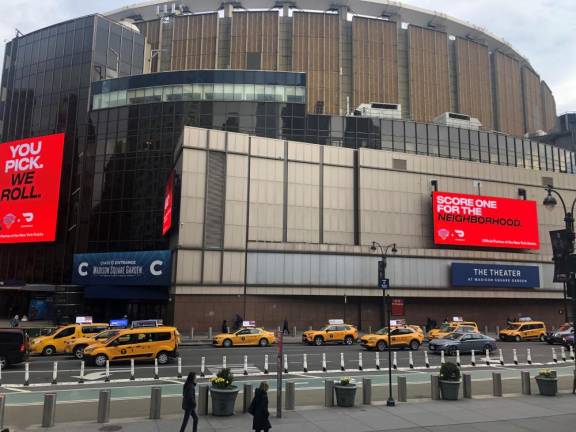MTA Chief Builder Says He’d Use Condemnation to Grab Jim Dolan’s MSG Property Needed for Penn Station Rebuild
MTA chief builder is taking tougher stance against Jim Dolan’s Madison Square Garden as says he would utilize the state’s power of eminent domain in the effort to rebuild Penn Station. The MTA has long held that improvements to Penn benefit the arena that sits atop and MSG should be happy to kick in for free its properties. MSG says it needs to be paid for any portion of its property to be used in the effort.


The MTA’s chief builder says that “if necessary” he would use the state’s power of condemnation to take property from Madison Square Garden to rebuild Penn Station.
The dramatic, if intentionally vague, statement came at a crucial moment in negotiations with The Garden over a new permit to operate its 20,000 seat arena, which has sat atop Penn Station since the 1960’s when the financially collapsing Pennsylvania Railroad tore down its old and, now, much missed station and sold the property rights from street level up to The Garden.
Under The City’s land use procedures the City Council has until August 28 to set the terms of a new permit. The old one expired last month. At issue are not only the duration of any new permit, but what terms will be imposed on The Garden to remain where it is.
The MTA’s President of Construction, Jamie Torres Springer, has been barnstorming via zoom events to make his case that The Garden benefits so much from its location above Penn Station that it should cede property to facilitate reconstruction of the station.
This position has drawn much criticism as unrealistic and possibly setting up a legal fight with the Garden that would delay the rebuilding of the station and endanger federal funds that are being counted on to pay for much of the work.
But three Manhattan legislators rallied around the MTA, which is leading the railroads that use the station, Amtrak, New Jersey Transit and the MTA’s Long Island Rail Road.
“MSG must be required to provide the railroads with all the spaces necessary to complete the reconstruction of Penn Station at no cost,” said the legislators, Senators Liz Krueger and Brad Hoylman-Sigal and Assembly member Tony Simone.
Writing in The Daily News, they said, “MSG benefits tremendously from its location atop the transit hub and it is only reasonable that the arena cooperate to fix Penn.”
The Garden has said it is open to negotiate, but has rejected the idea it should simply cede property. It has separately negotiated a deal with an Italian developer, ASTM, which proposes to pay The Garden $450 million for property needed to rebuild Penn Station. Armed with this agreement, ASTM is asking to be named the master developer of Penn Station.
While Governor Hochul has announced the state is open to all ideas, the MTA has said ASTM can offer its proposal later. In the meantime, the MTA has been pressing the council to enforce its effort to get the Garden to turn over property.
This property includes the derelict taxiway between 33d and 31st streets that the MTA wants to build a mid block train hall and land at the corners of Eights Avenue and 31st and 33d streets for expanded eighth avenue entrances. The ASTM plan also includes the sale of the theatre at Madison Square Garden, which ASTM would demolish to build a grand train hall on Eight Avenue.
At a meeting with members of Community Board five, one of the members, Renee Kinsella, raised the issue of what would happen if no agreement is reached between the MTA and The Garden. “As you approach the negotiation with MSG would you be considering the use of condemnation power at all,” Kinsella asked Torres Springer.
“If necessary,” he replied.
Torres Springer through a spokesman declined to elaborate on what would make such a condemnation necessary. Some critics of the MTA approach have said that even if such a condemnation was upheld, a court would probably insist that the Garden be paid for the land.
At the Board Five meeting, the chair of the land use committee, Layla Law-Gisiko, pressed Torres Springer to describe the state of discussions between The Garden and the other parties.
“I don’t think I should really talk about negotiations,” said Torres Springer.
He noted that the railroads had been asked by the City whether the Garden can be “compatible” with the station.
“We submitted a report that said, yes, it can,” Torres explained. “But that it requires some significant things from the arena. And we are very hopeful that the arena decides to come to an agreement with us on that.”
Torres Springer’s description emphasized a half-full reading of that compatibility study, which literally said the Garden’s “existing configuration and property boundaries” were not currently compatible with the station and “impede the safe and efficient movement of passengers and restrict efforts to implement improvements.”
In addition to the issue of what commitments the Garden would make to receive a new operating permit, much of the discussion has focused on the length of any new permit. The City in 1963 gave the Garden a permit to operate for fifty years.
When that permit expired in 2013 the City Council extended it for ten years on the condition that the Garden find a new location during the ten years. But when that permit expired last month, The Garden was still in place.
The Garden has asked for a new permit “in perpetuity” and the City Planning Commission has recommended ten years. But several council members, including Erik Bottcher and Gale Brewer have suggested a shorter time frame would be better to hold the Garden’s feet to the fire on improving the station.
“It is absolutely essential for us to fix Penn Station and build a modern, world-class transit hub that centers the needs of transit riders and puts safety first,” The three state legislators wrote. “Ideally, MSG should relocate to facilitate a total transformation of Penn Station. However, if MSG is permitted to stay, we believe the new special permit must be limited to three years.”